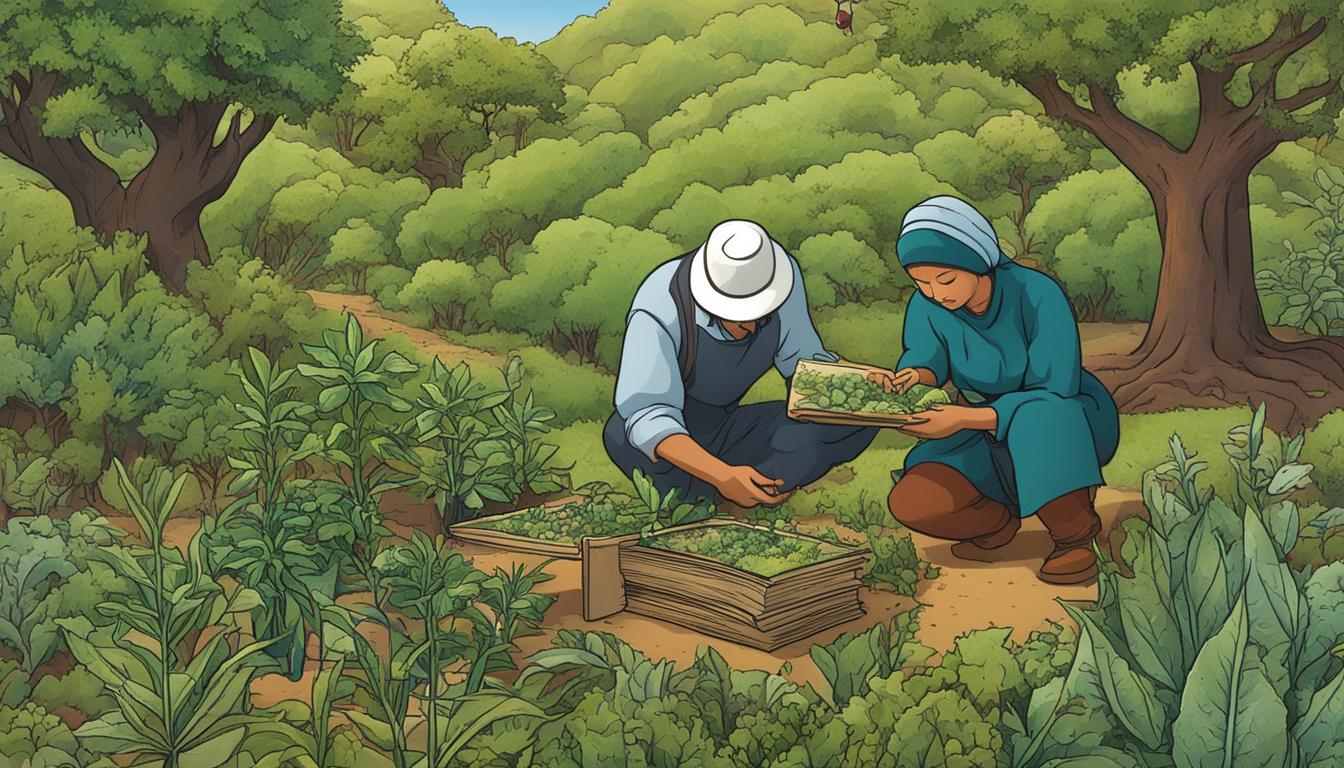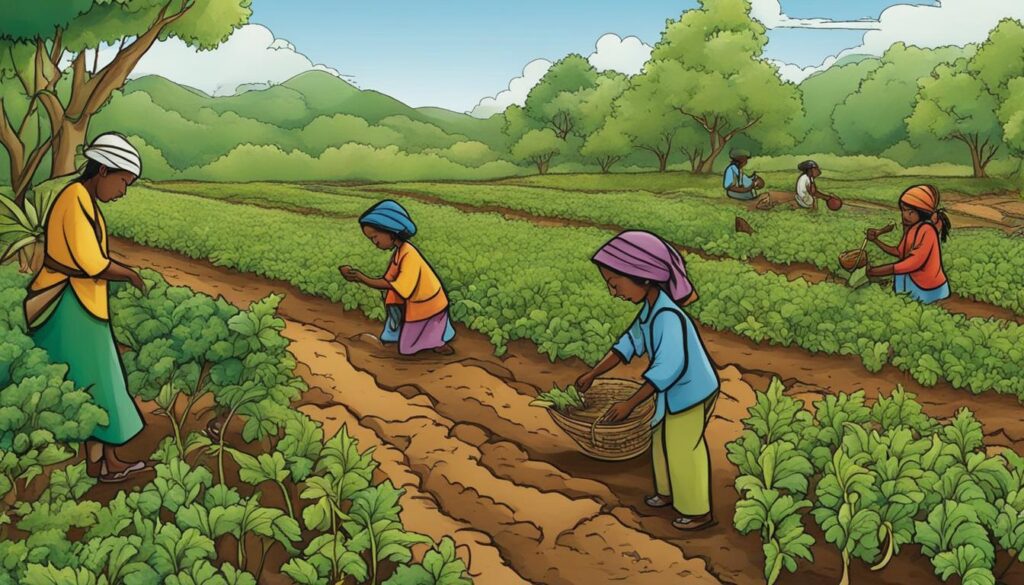
Harvesting medicinal plants raises important ethical considerations that need to be addressed. The increasing demand for herbal medicine has led to overharvesting of certain plants, posing a threat to their population and biodiversity.
The need for sustainable and responsible harvesting practices is crucial to ensure the preservation of these natural resources.
Ethical guidelines can help guide the responsible collection and cultivation of medicinal plants, taking into account factors like conservation, cultural appropriation, and fair trade.
Key Takeaways
- Overharvesting of medicinal plants is a significant concern due to the growing demand for herbal medicine.
- Sustainable harvesting practices are necessary to prevent the depletion of medicinal plant resources.
- Conservation efforts play a vital role in preserving the biodiversity of medicinal plants.
- Cultural appropriation of traditional knowledge must be prevented in the harvesting of medicinal plants.
- Supporting fair trade initiatives can contribute to ethical sourcing of medicinal plants.
The Impact of Overharvesting on Medicinal Plants
Overharvesting of medicinal plants has become a significant concern due to the growing demand for herbal medicine. This practice involves collecting plants at a rate that exceeds their natural ability to reproduce and replenish.
As a result, many medicinal plant species are becoming endangered or threatened, and their populations are declining. Sustainable harvesting practices are necessary to prevent the depletion of these valuable resources and maintain the long-term availability of medicinal plants.
The consequences of overharvesting are far-reaching. It disrupts the delicate balance of ecosystems, affecting not only the targeted plant species but also other dependent organisms.
Overharvesting jeopardizes traditional knowledge and cultural practices associated with medicinal plants, as well as the livelihoods of local communities who rely on these resources. Without measures to curb overharvesting, we risk losing countless plant species with potential medicinal value.
To address this issue, it is crucial to promote sustainable harvesting practices that prioritize the conservation and preservation of medicinal plants.
This includes implementing harvest quotas, establishing protected areas, and encouraging the cultivation of medicinal plants as an alternative to wild harvesting.
By adopting sustainable practices, we can ensure the availability of medicinal plants for future generations while safeguarding the delicate ecosystems in which they thrive.
| Impact of Overharvesting on Medicinal Plants | Consequences |
|---|---|
| 1. Declining populations of medicinal plant species | – Loss of biodiversity – Risk of extinction – Limited availability for future generations |
| 2. Disruption of ecosystems | – Negative impact on other dependent organisms – Loss of ecological balance |
| 3. Threat to traditional knowledge and cultural practices | – Jeopardized cultural heritage – Loss of traditional healing practices |
| 4. Impact on local communities | – Loss of livelihoods – Economic instability |
It is essential for individuals, organizations, and governments to recognize the importance of sustainable sourcing and consumption of medicinal plants.
By supporting initiatives that promote ethical harvesting practices, such as fair trade and organic certification, we can contribute to the preservation of these valuable resources.
Raising awareness about the impact of overharvesting and advocating for responsible consumer choices can drive positive change in the industry.
Conservation and Biodiversity
Conservation plays a vital role in preserving the biodiversity of medicinal plants. By protecting natural habitats and implementing conservation measures, we can ensure the survival of endangered plant species.
The loss of biodiversity can have far-reaching consequences, affecting not only the plants themselves but also the ecosystems they inhabit. Medicinal plants are often part of complex ecological networks, playing important roles in pollination, seed dispersal, and nutrient cycling.
Biodiversity is essential for maintaining the stability and resilience of ecosystems. It provides a wide range of ecosystem services, including climate regulation, water purification, and pest control. By conserving medicinal plants and their habitats, we help safeguard these vital services that support human well-being and the health of the planet.
| Benefits of Conservation for Medicinal Plants | Threats to Conservation |
|---|---|
|
|
Collaborative initiatives between governments, communities, and conservation organizations are essential to conserve medicinal plants and their habitats.
These initiatives can involve the establishment of protected areas, the enforcement of regulations against illegal harvesting, and the promotion of sustainable land-use practices. By working together, we can protect the rich biodiversity of medicinal plants and ensure their availability for future generations.

Cultural Appropriation and Traditional Knowledge
The harvesting of medicinal plants is deeply intertwined with the traditional knowledge and practices of indigenous communities. These communities have relied on the healing properties of these plants for centuries, developing a wealth of knowledge about their properties, preparation, and usage.
But, the exploitation and appropriation of this traditional knowledge without proper consent or recognition is a significant ethical concern.
Cultural appropriation refers to the unauthorized and exploitative use of traditional knowledge and resources, often leading to the commercialization and commodification of indigenous cultural heritage.
This can result in economic and cultural harm to indigenous communities, as their traditional practices are used without fair compensation or acknowledgment.
Respecting and valuing the traditional knowledge of indigenous peoples is essential in the ethical harvesting of medicinal plants. Collaboration, consent, and fair compensation are necessary to ensure the protection and preservation of traditional knowledge and cultural heritage.
By working in partnership with indigenous communities, researchers, and organizations can develop ethical guidelines that foster mutual respect and ensure the equitable sharing of benefits.
Ways to Respect Traditional Knowledge:
- Seek informed consent from indigenous communities before using their traditional knowledge.
- Collaborate with indigenous communities and involve them in decision-making processes regarding the harvesting and use of medicinal plants.
- Ensure fair and equitable compensation for the use of traditional knowledge, acknowledging its cultural significance and value.
- Promote cultural exchange and knowledge sharing that is respectful, equitable, and mutually beneficial.
| Benefits of Respecting Traditional Knowledge | Challenges of Cultural Appropriation |
|---|---|
|
|
Fair Trade and Sustainable Sourcing
Fair trade principles and sustainable sourcing practices are essential in ensuring the ethical harvesting of medicinal plants. By supporting fair trade initiatives, consumers can contribute to the protection of both the environment and the livelihoods of local communities.
Fair trade promotes equitable wages and working conditions for farmers and harvesters, while also considering the long-term sustainability of these valuable resources.
Sustainable sourcing focuses on minimizing the environmental impact of harvesting medicinal plants. It involves cultivating plants in a way that preserves biodiversity, conserves natural resources, and protects ecosystems.
Sustainable sourcing also emphasizes the use of organic and environmentally friendly practices, such as avoiding the use of chemical pesticides and promoting regenerative agriculture.
In addition to supporting fair trade and sustainable sourcing, consumers can make informed choices by looking for certifications and labels that indicate ethical and responsible sourcing.
Labels such as Fairtrade, USDA Organic, and Rainforest Alliance Certified can help consumers identify products that meet certain ethical and environmental standards.
By prioritizing these certifications, consumers can actively contribute to the preservation of medicinal plant species and promote a more sustainable future.
Benefits of Fair Trade and Sustainable Sourcing
- Preserves biodiversity and protects endangered plant species
- Supports the livelihoods of local communities
- Promotes equitable wages and working conditions
- Reduces the environmental impact of harvesting practices
- Encourages the use of organic and environmentally friendly cultivation methods
| Label/Certification | Description |
|---|---|
| Fairtrade | A certification that ensures fair prices and better working conditions for farmers and workers in developing countries. |
| USDA Organic | A certification that guarantees the use of organic farming practices and the absence of synthetic chemicals in the cultivation process. |
| Rainforest Alliance Certified | A certification that promotes the conservation of biodiversity and sustainable livelihoods through responsible business practices. |
By supporting fair trade and sustainable sourcing, consumers can contribute to the ethical harvesting of medicinal plants and make a positive impact on both the environment and the communities involved in their production.

Ethical Guidelines for Harvesting Medicinal Plants
Ethical guidelines are crucial in ensuring the responsible harvesting of medicinal plants. These guidelines provide a framework for sustainable practices that protect the environment, biodiversity, and the rights of indigenous communities.
Organizations such as United Plant Savers and the Convention on International Trade in Endangered Species of Wild Fauna and Flora (CITES) have established regulations and certifications to guide the ethical sourcing and trade of medicinal plants.
These guidelines emphasize the importance of sustainability, conservation, and cultural respect. They encourage the use of cultivation methods that minimize the impact on wild populations and promote the responsible management of medicinal plant resources.
By following these guidelines, harvesters can minimize the risk of overharvesting and contribute to the preservation of biodiversity.
Furthermore, ethical guidelines address the issue of cultural appropriation by promoting collaboration, consent, and fair compensation. They recognize the traditional knowledge and practices of indigenous communities and aim to protect and preserve their cultural heritage.
By adhering to these guidelines, harvesters can ensure that the collection of medicinal plants is done in a respectful and sustainable manner.
The Importance of Certification
Obtaining certification from reputable organizations is an important step in demonstrating compliance with ethical guidelines. Certification provides credibility and assurance to consumers, indicating that the harvested plants have been sourced responsibly.
It also helps raise awareness about the importance of ethical sourcing and promotes transparency in the herbal medicine industry.
Harvesters and suppliers who obtain certification demonstrate their commitment to ethical practices, environmental stewardship, and the well-being of local communities.
As a consumer, choosing products with certified ingredients allows you to support responsible brands and make a positive impact on the preservation of medicinal plants.
Challenges in Organic Cultivation of Medicinal Plants
Organic cultivation of medicinal plants offers a sustainable solution to mitigate the impacts of wild harvesting. However, there are unique challenges that hinder the widespread adoption of organic herb cultivation.
One of the primary challenges is the limited infrastructure and resources available for farmers interested in transitioning to organic practices. Creating and maintaining organic farms requires specialized knowledge, access to organic seeds and fertilizers, and implementing proper cultivation techniques.
In addition to infrastructure limitations, the high costs associated with organic cultivation can also pose challenges for farmers.
Organic certification processes and compliance with organic standards require investments in training, inspections, and documentation, which can be financially burdensome, particularly for small-scale farmers. These costs can make it difficult for farmers to afford the necessary resources and certifications needed for organic cultivation.
Despite these challenges, efforts are being made to support the development of organic cultivation programs for medicinal plants. Organizations and initiatives provide farmers with training, resources, and technical assistance to help them transition to organic practices.
This includes guidance on organic pest and disease management, soil fertility enhancement, and sustainable harvesting techniques. The aim is to empower farmers with the knowledge and tools necessary to overcome the challenges of organic cultivation and promote the sustainable production of medicinal plants.
The Benefits of Organic Cultivation
While there are challenges in organic cultivation, it is essential to highlight the benefits that come with this approach. Organic cultivation methods prioritize the use of natural fertilizers, pest control, and weed management practices, reducing the reliance on synthetic chemicals.
This has positive impacts on the environment by minimizing water pollution, preserving soil quality, and supporting biodiversity. Organic cultivation also promotes healthier and safer products for consumers, as organic herbs are free from synthetic pesticides and genetically modified organisms.
Furthermore, organic cultivation aligns with the principles of fair trade and ethical sourcing. It ensures that farmers are paid fair wages and work under favorable conditions, contributing to the economic empowerment of local communities.
By choosing organic products, consumers can support sustainable agricultural practices and contribute to the preservation of medicinal plant species and their habitats.
| Challenges in Organic Cultivation | Benefits of Organic Cultivation |
|---|---|
| – Limited infrastructure and resources | – Environmentally friendly practices |
| – High costs of certification | – Safer and healthier products |
| – Training and knowledge gaps | – Economic empowerment of farmers |

Responsible Consumer Choices
As consumers, we have the power to make a difference by making responsible choices when it comes to the products we buy. This holds true for the harvesting and sourcing of medicinal plants.
By being informed and conscious consumers, we can support sustainable and ethical brands that prioritize the responsible collection and cultivation of these valuable resources.
One way to make responsible consumer choices is by opting for products made from cultivated herbs. Cultivated herbs are grown using sustainable farming practices, ensuring a steady supply of medicinal plants without depleting their wild populations.
Look for products that explicitly state they are made from responsibly cultivated herbs, supporting brands that prioritize environmental sustainability.
Supporting fair trade initiatives is another important aspect of responsible consumer choices. Fair trade ensures that farmers and harvesters receive fair wages and working conditions, promoting economic justice and sustainability.
Look for certifications like Fairtrade International or Fair for Life, which guarantee that the medicinal plants used in the products you purchase are sourced ethically and support the livelihoods of local communities.
Finally, choosing certified organic or ethically wild-harvested botanicals is another way to make responsible consumer choices. Organic certification ensures that the plants were grown without the use of synthetic pesticides or fertilizers, reducing environmental impacts and promoting biodiversity.
Ethically wild-harvested botanicals are plants that have been collected in a sustainable and respectful manner from their natural habitats, without harming their populations or ecosystems. Look for certifications like USDA Organic or ethical wild-harvested labels when selecting herbal products.
| Responsible Consumer Choices for Medicinal Plants |
|---|
| Opt for products made from cultivated herbs |
| Support fair trade initiatives |
| Choose certified organic or ethically wild-harvested botanicals |
By making these responsible consumer choices, we can contribute to the ethical harvesting of medicinal plants and support sustainable practices. Let’s use our purchasing power to create a positive impact on both the environment and the livelihoods of those involved in the herbal medicine industry.
The Importance of Education and Awareness
Education and awareness play a crucial role in addressing the ethical considerations in harvesting medicinal plants. By providing individuals with the knowledge and understanding of these issues, we can empower them to make informed decisions and promote responsible practices.
Through education, we can create a collective consciousness that values the preservation of natural resources and respects the cultural heritage associated with traditional medicine.
Increasing awareness about the impacts of overharvesting and the need for sustainable practices is essential in mitigating the negative consequences on medicinal plant populations.
By understanding the ecological importance of these plants and their role in maintaining biodiversity, individuals can appreciate the need for conservation efforts.
Awareness campaigns can also highlight the cultural significance of medicinal plants and emphasize the importance of respecting indigenous knowledge and practices.
Benefits of Education and Awareness:
- Empowers individuals to make informed decisions
- Promotes responsible harvesting practices
- Fosters appreciation for the cultural heritage associated with traditional medicine
- Highlights the ecological importance of medicinal plants
- Encourages conservation efforts and biodiversity preservation
Through education and awareness, we can work towards a future where the harvesting of medicinal plants is guided by ethical considerations. By equipping individuals with the necessary information, we can inspire positive change and ensure the sustainable availability of these valuable resources for generations to come.
| Benefits | Description |
|---|---|
| Informed Decisions | Education and awareness empower individuals to make responsible choices regarding the sourcing and consumption of medicinal plants. |
| Responsible Practices | By understanding the ethical considerations, individuals can promote sustainable harvesting practices and support initiatives that prioritize conservation. |
| Cultural Heritage | Education raises awareness of the cultural significance of traditional medicine, fostering appreciation for indigenous knowledge and practices. |
| Ecological Importance | Awareness about the ecological role of medicinal plants promotes their conservation and contributes to biodiversity preservation. |
The Future of Ethical Harvesting Practices
As we continue to navigate the increasing demand for medicinal plants, the future of ethical harvesting practices holds great importance. It is essential that we prioritize sustainability, conservation, and cultural respect in our approach to harvesting these valuable resources.
Research and education play significant roles in shaping the future of ethical harvesting practices. By investing in scientific studies and sharing knowledge about sustainable cultivation methods, we can develop innovative techniques that minimize the impact on plant populations and ecosystems.
Furthermore, educating individuals about the ethical considerations involved in harvesting medicinal plants can empower consumers and decision-makers to make informed choices that support responsible sourcing.
Policy development is another crucial aspect of shaping the future of ethical harvesting practices. Governments and regulatory bodies can play a pivotal role in establishing guidelines and regulations that ensure the sustainable and responsible collection of medicinal plants. This includes encouraging certifications and labels that promote transparency and accountability in the industry.
Collaboration among stakeholders is key to driving change and ensuring the long-term viability of ethical harvesting practices. By working together, governments, researchers, indigenous communities, conservation organizations, and industry leaders can develop holistic solutions that balance the needs of both people and the environment.
Through collective efforts, we can create a future where the harvesting of medicinal plants is done with utmost care and consideration, safeguarding these resources for generations to come.
FAQ
What are the ethical considerations in harvesting medicinal plants?
The ethical considerations in harvesting medicinal plants include sustainable and responsible practices, conservation efforts, cultural respect, fair trade, and adherence to ethical guidelines.
What is the impact of overharvesting on medicinal plants?
Overharvesting of medicinal plants can lead to the decline and endangerment of certain species, posing a threat to their population and biodiversity. Sustainable harvesting practices are necessary to prevent depletion and maintain long-term availability.
How does conservation contribute to the preservation of medicinal plants?
Conservation efforts play a vital role in preserving the biodiversity of medicinal plants. By protecting natural habitats and implementing conservation measures, we can ensure the survival of endangered plant species and maintain ecological stability.
What is cultural appropriation in the context of medicinal plant harvesting?
Cultural appropriation refers to the unauthorized and exploitative use of traditional knowledge and resources without proper consent or recognition. Respecting and valuing the traditional knowledge of indigenous peoples is essential in the ethical harvesting of medicinal plants.
How does fair trade promote ethical sourcing of medicinal plants?
Fair trade principles ensure that farmers and harvesters receive fair wages and working conditions, while also considering environmental sustainability. Supporting fair trade initiatives contributes to the ethical sourcing of medicinal plants and supports the livelihoods of local communities.
Are there ethical guidelines available for the harvesting of medicinal plants?
Yes, there are various ethical guidelines and certifications available to guide the responsible harvesting of medicinal plants. These guidelines encompass principles of sustainability, biodiversity conservation, cultural respect, and fair trade.
What are the challenges in organic cultivation of medicinal plants?
The challenges in organic cultivation of medicinal plants include limited infrastructure and high costs, making it difficult for farmers to engage in wide-scale organic herb cultivation.
How can consumers make responsible choices in relation to medicinal plants?
Consumers can make responsible choices by supporting sustainable and ethical brands, choosing products made from cultivated herbs, supporting fair trade initiatives, and opting for certified organic or ethically wild-harvested botanicals.
What is the importance of education and awareness in ethical harvesting practices?
Education and awareness are essential in promoting understanding and respect for ethical considerations in harvesting medicinal plants. By raising awareness, individuals can make more informed decisions and support initiatives that prioritize ethical sourcing and conservation.
What does the future hold for ethical harvesting practices?
The future of ethical harvesting practices relies on a collaborative effort to promote sustainability, conservation, and cultural respect. Research, education, and policy development are crucial in ensuring the ethical sourcing of medicinal plants for future generations.







3 Comments
Comments are closed.